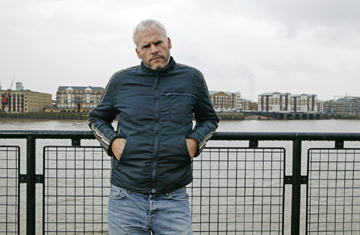
SO BAD, IT'S GOOD: In McDonagh's world, horrifying can be hilarious
Compared to what Martin McDonagh has put his characters through on stage, the ones in his first feature film have it easy. Over the years, the playwright has turned brothers against brothers, pushed a daughter to murder her mother, drowned a priest, broken countless hearts and killed several small animals.
In McDonagh's plays, even the most seemingly normal person can turn out to be a sociopath. In his feature debut, In Bruges, the sociopaths turn out to be as normal as the rest of us. The movie offers up carnage, emotional torment and a racist dwarf as it follows two hit men sent to the Belgian city after a job gone bad — but, in the end, it's really just a tale of love and honor. McDonagh describes the film as the most hopeful thing he has ever written. "It's about guilt, redemption, self-sacrifice, and it could have been much bleaker," he says. "But we always had the comedy to keep despair at the door."
The comedy is McDonagh's signature. He can shock an audience into laughing at just about anything (suicide, patricide, terrorism, famine), and his expletive-ridden dialogue — its cadence and Celtic slang borrowed from his Irish background — can make even the most banal comment sound like a punch line. Audiences first fell for McDonagh's gritty, witty brand of theater in 1996, when his first play, The Beauty Queen of Leenane — about the love-hate relationship between a spinster and her domineering mother — won the then 26-year-old a handful of awards and the first of many Tony nominations. Since then, he has been selling out theaters from Broadway to the West End with seven plays, all written in a 10-month spurt during a bout of unemployment in the mid-'90s.
Not bad for a guy who didn't even want to write plays, but movies; McDonagh turned to theater only after all his film scripts were rejected. His second chance at his first love came when he wrote and directed the 2004 short film Six Shooter, about a grieving widower on a bizarre and ultimately deadly train journey. It won an Oscar, and soon after he was in Bruges shooting In Bruges.
The idea for the film — part buddy flick, part thriller, part existential drama — came to McDonagh on a weekend away in the quaint Flemish city. On day one, he was taken with the place: "the canals, the cobbled streets, the fairy tale-like quality of it." By day two, he was bored out of his mind. And from his conflicting desires — get some culture vs. get drunk — his two characters, Ray and Ken, were born. After botching a job, newbie hit man Ray (played by Colin Farrell) and his mentor Ken (Brendan Gleeson) are sent to Bruges to cool their heels. As they wait for instructions from boss Harry (Ralph Fiennes), Ken wants to take in the sights but Ray would rather meet girls and make fun of American tourists. The film's first half is pure comedy, as Ken and Ray bicker like two overgrown schoolkids. Then a second hit goes wrong and things get bloody.
After a career spent in the wings watching others direct his work, McDonagh wasn't comfortable calling the shots at first. "The buck has never stopped with me before," he says. "It was terrifying." But the actors profited from his inexperience as a filmmaker. "Because he's a playwright, he's very particular about how the dialogue is spoken," Fiennes says. "The nuances, the rhythms, the repetitions are so specific, even with the four-letter words, that we wanted to get it exactly right. And we were excited by the challenge."
The excitement got to McDonagh, too, and he's looking forward to making another movie. But not yet. "Everything's been a whirlwind since my first play, and I haven't had time to step back and analyze that," he says. "I just need some quiet time to write, hang out and grow up." And to hone that twisted sense of humor. "I'd actually like to try a romantic comedy," he says with a grin. "A different kind. One with dead kids in it." Odds are, he's only half joking.
